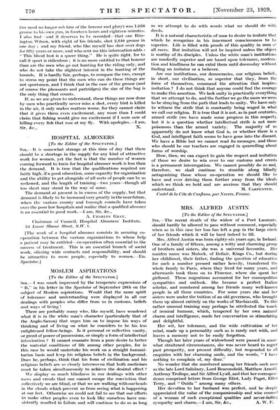MOSLEM ASPIRATIONS
[To the Editor of the SPECTATOR.] was much impressed by the temperate expressions of " B." in his letter in the Spectator of September 28th on the subject of Moslem aspirations. Would that the same spirit of tolerance and understanding were displayed in all our dealings with peoples who differ from us in customs, beliefs and ways of living !
There are probably many who, like myself, have wondered what it is in the white man's character (particularly that of the Anglo-Saxon) that urges him on to impose his ways of thinking and of living on what he considers to be his less enlightened fellow-beings. Is it personal or collective vanity, or greed of power of possessions, or simply a form of intellectual intoxication ? It cannot emanate from a pure desire to better the material conditions of life among other peoples, for in this ease he would undertake his work on a straight humani- tarian basis and k'ep his religious beliefs in the background. Does he, perhaps, think that his form of civilization and his religious beliefs are so closely interwoven that both medicines must be taken simultaneously to achieve the desired effect ?
We display so much blindness in our dealings with other races and creeds that one cannot escape the conviction that collectively we are blind, or that we are walking with our heads in the clouds which prevent us from seeing what is happening at our feet. Otherwise we could not fail to see that our efforts to make other peoples even to look like ourselves have con- sistently resulted in failure and will continue to do so as long as we attempt to do with words what we should do with deeds.
It is a natural characteristic of man to desire to imitate that which he recognizes in his innermost consciousness to be superior. Life is filled with proofs of this quality in men of all races. But imitation will not be inspired unless the object is worthy of its disciples. Unless the white man's institutions are markedly superior and are based upon tolerance, modera- tion and kindliness he can extol them until doomsday without finding an imitator or a believer.
Are our institutions, our democracies, our religious beliefs, in short, our civilization, so superior that they, from the force of themselves, command the attention that inspires imitation ? I do not think that anyone could find the courage to make this assertion. We lack unity in practically everything that we attempt to do, and the further we go the more we seem to be straying from the path that leads to unity. We have only to witness the strife that is constantly being waged in what we call our religion. It is true that it is not, as in past centuries, armed strife (we have made some progress in this respect), but it is a question whether intellectual strife is not more poisonous than the armed variety. The majority of us apparently do not know what God is, or whether there is a God, and intelligent faith seems to have gone into the discard. We have a Bible but we cannot read its messages, and those who should be our teachers are engaged in quarrelling about forms of worship.
How, then, we can expect to gain the respect and imitation of those we desire to win over to our customs and creeds is a permanent interrogation. We cannot possibly do so and, therefore, we shall continue to stumble along blindly antagonizing those whose co-operation we should like to have and ever drivi g them further away from the ideals which we think we hold and are anxious that they should






























































 Previous page
Previous page